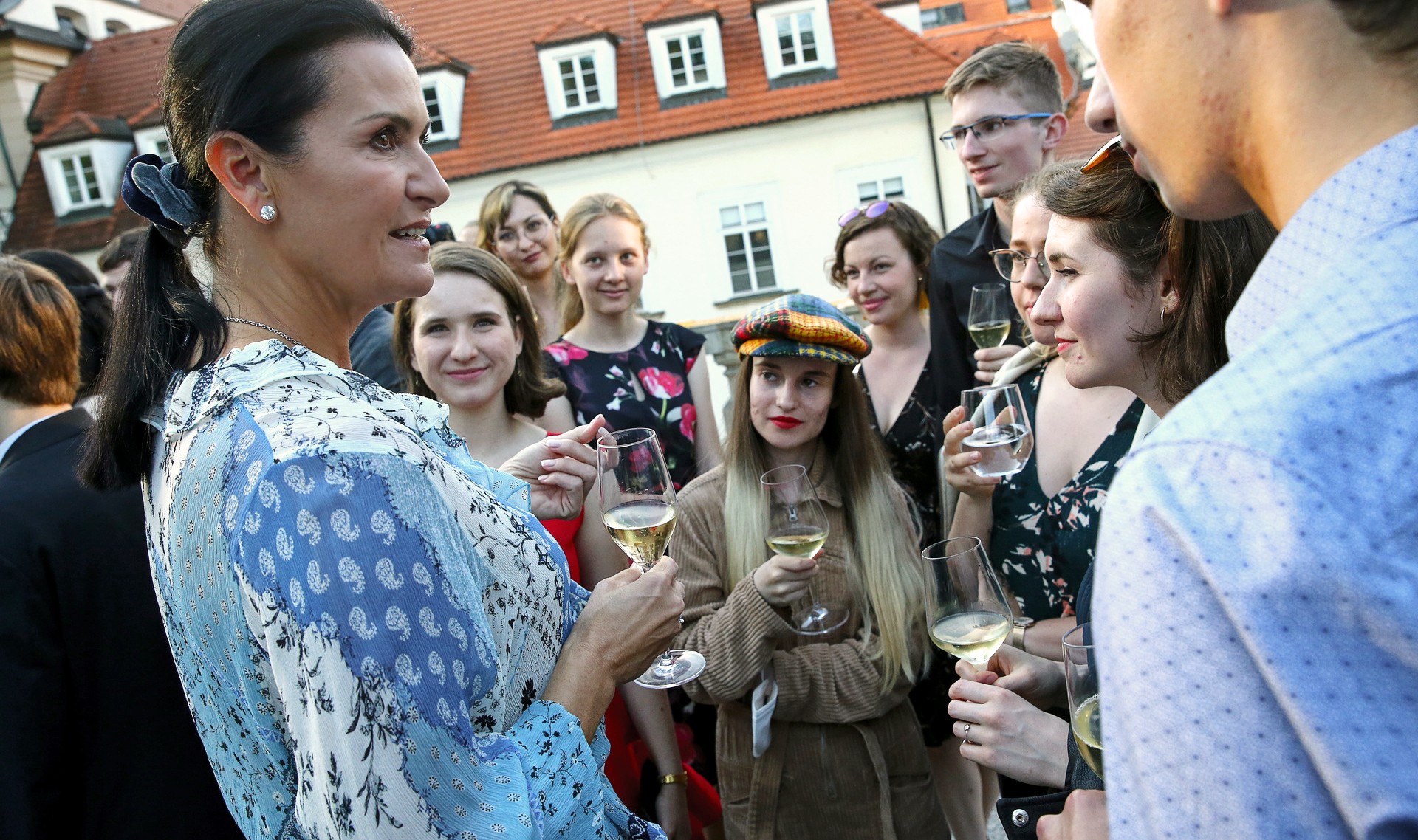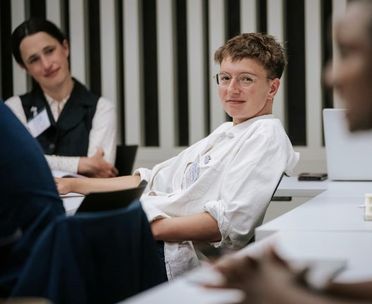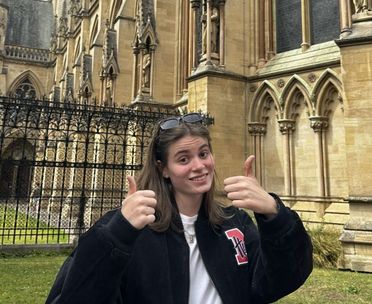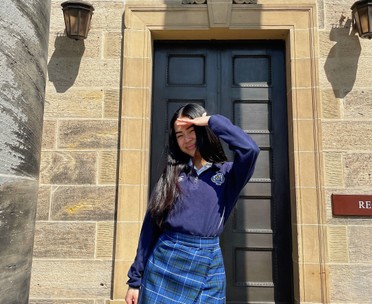

OKD Is Done; Criticism From Babis or Zeman Are Compliments
June 30, 2021
In a short break between interviews with the Bakala Foundation scholarship applicants, Michaela Bakala switched roles to be interviewed herself. The interview, created for the Czech public broadcaster, was subsequently published on the news website HlídacíPes.org under the title “Bakala’s say: OKD is done, and criticism from people like Babiš or Zeman is actually a compliment.” We publish it with their gracious permission.
The name Bakala still resonates strongly in the Czech, public domain. But for a part of the public and some politicians, it has a negative connotation, especially when it comes to Zdenek Bakala’s involvement in the OKD mining company. “I don’t see that as a stigma,” says his wife, Michaela Bakala. “My husband visits on a regular basis, although perhaps not as often. But when one becomes the target of such politically motivated media pressure, it is natural for a person to move his priorities elsewhere. However, my husband never avoided responsibility; he answered all the questions, and during the investigation always provided any required information. In any case, all previous court proceedings and investigations turned out to be in his favor.”
Czech Radio: As for the name Bakala, you don’t use its feminine form, is that correct?
Michaela Bakala: I have been living abroad permanently for 12 years, and there we use Bakala, but in the Czech Republic, people can call me “Bakalová,” of course. I don’t think the use of the feminine form is a thing of the past, but now we are open to the world, there are many mixed marriages, and people live abroad, so I am glad we don’t have to use the feminine form. I am not too concerned about it myself, but I wouldn’t use it for the names of foreign women.
I asked this question because part of Czech society and some politicians perceive the name Bakala almost as having a stigma. It provokes a lot of emotions. Do you know why this is so?
I don’t feel it has a stigma. I am proud of the name. I know the values that my husband upholds in his life. I have been with him long enough to know he is consistent. After all, he has been provoking emotions on the political scene since the 1990s, when he was one of the first people who dared criticize the voucher privatization of Václav Klaus and was actively involved in the business and political forum Lípa, which had a critical approach to the transformation in the 1990s. He helped found the Prague Stock Exchange. I know that Zeman and Klaus were not in favor of this. So, I take these people and politicians’ stigmatizing more as a compliment and validation of our values.
Is the topic of OKD closed for you as a family, personally, and for your husband?
In a way, yes. This investment went through its development. The crisis in the energy sector devastated more than the Czech mines. OKD’s doom was preceded by bankruptcies and insolvency of mining companies around the world. It was no longer a question of whether the management’s decisions were the right ones or not. It is being retroactively confirmed that none of the decisions breached the law; there is no point revisiting this issue.
As long as OKD was able to mine coal and generate profit, the mines were kept in business and were giving work to people, but the moment mining turned out to be financially unsustainable in the long run, there was nothing to be done about it. Just as people used to work in fields that no longer exist, the coal reserves will be depleted one day, and the mines will be closed. I think that OKD is an example of privatization that turned out well for the Czech Republic. The company kept going for many years, spending money on investments and employing a lot of people. The fact that OKD got into a long-term crisis because of adverse price developments is a different matter. Neither management nor shareholders could have done anything about it.
But isn’t OKD one of the main reasons why you visit the Czech Republic regularly, while your husband doesn’t? There were, for example, threats from MPs on the OKD Inquiry Commission that they would have Zdeněk Bakala brought in by the police upon arrival.
This has nothing to do with it. My husband visits on a regular basis, although perhaps not as often. But when one becomes a target of such politically motivated media pressure, it is natural for such a person to move his priorities elsewhere. However, my husband never avoided responsibility; he answered all the questions, and during the investigation, always provided any required information. In any case, all previous proceedings and investigations turned out to be in his favor. He has been saying this from the beginning, as did I, but of course, it didn’t fit with the pre-set hostile atmosphere.
You run several philanthropic activities. Do you focus specifically on the Ostrava region because of your involvement in OKD?
The Czech Republic is not so big to have to distinguish individual regions. However, when my husband was involved in OKD, the OKD Foundation was established, thanks to him, and it focused primarily on that region. We believe that people who have been given an opportunity in their life should give something in return. I, personally, am grateful even for unpleasant things, as they also shape one somehow. The feeling of responsibility, not only to our country but also to that region, has always been there.
You have been primarily living abroad for 12 years. Do you find time to follow how capitalism is developing in the Czech Republic in recent years, for example, compared to the countries where you live, mainly the USA or Switzerland?
I think it is becoming more professional, partly because we are part of the European Union. There are many foreign investors, we are replicating the development of the German economy, and we are perceived as a stable partner. But we must continue to keep it that way and think about where we want to be twenty or thirty years from now.
In the Czech Republic, there is often talk of media oligarchization. It is interesting that some time ago, for example, the Endowment Fund for Independent Journalism stopped ranking your husband Zdeněk Bakala among oligarchs arguing that the “right oligarch” has business dealings with the state and therefore also an interest in actively influencing events, legislation, and the like. Is it correct that you no longer have any other business in the Czech Republic, except for the Economia publishing house?
My husband’s investment in the media was not an investment for his benefit or for gaining influence. He felt that media like Respect and Economia deserved to stay in the market and develop further. He took it as a project and a professional challenge, and none of us ever thought of using it as a tool for our own PR or for gaining business or political influence.
In the past, when I have personally held positions in PR and as a spokesperson, I respected journalists as separate entities and partners, not as friends or opponents. Media ownership by someone who no longer has any significant business involvement in a given territory is even easier. It is essential for us to keep up quality and independence. We consider this investment to be part of our philanthropy rather than a purely business investment. At the same time, Economia does have its value. We are regularly asked when we will sell it; there is great interest in acquiring it. This confirms it has value regardless of its current financial returns.
So there is still interest in acquiring Economia? Despite the fact that you repeatedly dismissed reports that you are going to sell it and confirmed that it is not and will not be for sale?
And we keep repeating it, but the offers keep coming. Economia plays an irreplaceable role in the Czech Republic, and its value and brand are proving themselves. In the long run, it has turned out to be the right investment.
With my first question about Economia, I wanted to know if this is your last significant investment in the Czech Republic. Because you sold Forum Karlín, you had initially 28 boutiques selling luxury watches, jewelry, and fashion in Pařížská Street, but now there are just a few of them left.
This is the result of natural development and the fact that we live abroad and the core of our investments are also now abroad. But we still have an investment team looking for opportunities in the country, and we are ready to take them up. After all, we still have some other investments and real estate properties here. I consider the core of our activities to be philanthropy, the support of talented students. Logically, the most visible to the public is the Economia publishing house. But we have not been members of its corporate governance bodies for several years now. We want to demonstrate that we promote editorial independence.
But perhaps ideally, Economia should not be a financial drain; it should not be in red numbers.
The development in recent years shows that Economia will probably never generate large profits, but it can certainly be a self-sufficient company.
Are you planning any other media acquisitions either in the Czech Republic or abroad?
Once again – they would have to fit in the overall concept to make sense in my husband’s investment portfolio.
On the other hand, you supported quite generously, for example, the Hungarian opposition project Telex, with some 5.5 million Korunas, although it was a gift and not an investment.
My husband may seem reserved and unapproachable, but he has a heart. Such steps show that this region is close to his heart and that we have not forgotten the time when we were not free. When we saw people facing restrictions on their freedom of speech, signs of a country closing itself to the world, signs of the undermining of democratic values, well, it brought us to a bit of a spontaneous decision. An intuitive assist, a gesture, and an appeal that Central Europe must be alert and stand up and say this is unacceptable. It is necessary to monitor developments in Poland, for example, and to support free media, a free society. It is absolutely in our interest to remain part of the European Union; even if it needs some revitalization, we should not tear down the positive things the membership has brought us. It is not sufficiently noted that the development of the last thirty years is so positive because we are part of the EU and the free Western world. I fear the voices and tendencies claiming we would do better on our own.
As you mentioned media and political campaigns in the previous answers, I should add that you are suing financier Pavol Krúpa in the federal court in South Carolina, demanding an apology and damages for a campaign associated with a series of demonstrations, intimidation, and defamation. Do you take this personally?
It is not just about the personal aspect, which was quite unpleasant. I think, big picture, it is necessary to make it clear that his actions are intolerable. It is good that the trial is taking place in the United States because the company that Krúpa undeniably hired was also involved in other such cases. The story even attracted the attention of local media. The extortion and intimidation were orchestrated in a professional manner; it was not a case of spontaneous expression of disagreement and protests. When this turns into an illegal act, it’s time to say enough. I hope that thanks to our lawsuit, no one else will experience what we did, at least not as a result of the actions of this company. I am used to public criticism and supervision, even some opposition, but this was entirely different.
Is this experience a reason for you to keep a reputable publisher as a kind of counterbalance?
It is a broader issue, look at the development of the media throughout Central Europe, but also in the USA. We are experiencing a hybrid war in the public domain; serious investigations are being conducted to establish whether some agencies influenced the US presidential election. These are grave accusations, far-reaching matters, and we as a society are not well prepared for them. Disinformation and manipulation are dangerous in that while they are not tanks in the streets, they can attack at any time. In the past, journalism was a respected profession; today, one might be afraid to admit being a journalist, especially an investigative journalist. But a journalist must have integrity and courage, bringing their name into the open and bearing personal and professional responsibility for their work. It is in everyone’s interest to support professional media that relies on proven sources and verified facts. Journalists themselves should be able to stand up for their profession.
So how do you feel when you hear the words “Bakala’s media sect” from Andrej Babiš, for example?
I take it as proof Economia’s journalists are doing their job well as free media.
You regularly come back to the Czech Republic, mainly for Bakala Foundation events focused on education. You enable talented Czech students to study at the most prestigious universities abroad. But the last year, the Covid and also Brexit have perhaps caused a major disruption. How did this affect the students?
As for Brexit, I am sorry it happened. Even universities, which rely on the influx of brains, are affected because their ratings are based on the quality of their students and graduates. Students from the Czech Republic and the Central European region are known to be great students and hard workers. Unfortunately, studying in Britain will now be two to four times more expensive. Covid complicated travel, relocation, and accommodations, causing our students abroad a difficult time. We helped them come back home; we assisted them in continuing their studies. It may turn out that the future of education will change due to Covid. There are significant changes in technology taking place; this leads to changes in society. Covid has just accelerated everything. We need to be more computer literate; travel has become less necessary. I am not a fan of online teaching, but the dual learning concept may be here to stay.
Has Brexit affected the preferences of talented students regarding the countries in which they would like to study? For example, in the Nordic countries and Germany, where it’s possible to study in English?
People are applying for Holland, the Nordic countries, and also Israel, Switzerland. European universities have responded to Brexit and opened up more study fields in English. That is good; it is not necessary to go only to the USA or Britain. But we are discussing this as if it were automatic to study abroad. It is still uncommon. We must encourage young people not to be afraid of the idea, despite the challenge and expense. Quality education is never cheap. I also don’t mean to imply by this that there are no good universities in the Czech Republic, but when it comes to top-tier international education, it offers the chance of a lifetime. Even Honza [a Czech fairy tale character] went out into the world to gain experience.
Over the years, there have been many graduates supported by your scholarships. Is there anyone in particular of whose career you are especially proud?
This is a bit unfair; it is like asking me which was the most beautiful Czech Miss I crowned. Our foundation has supported over 180 scholarship holders. There are a lot of successful young people among them. But among graduates, there is, for example, Marie Salomonová, who founded her organization Nevypusť duši, which lectures about mental health, mental illnesses, and how to help people suffering from these issues. I’ve also recently spoken with Tomáš Kač, a graduate who studied jazz piano and composition at Berklee College in the USA and gave concerts at Carnegie Hall. And there is also Petr Winkler, who recently became the director of the National Institute of Mental Health. There are many such ones, and I wish I could list all of them here. I am convinced that all those graduates are a benefit for the Czech Republic.
***
Michaela Bakala is an entrepreneur and manager, but today – as she says – she is, above all, a mother and philanthropist. She is dedicated to supporting education, developing a democratic society, and strengthening the role of women. She is the Chair of the Boards of Trustees of the family foundations, the Bakala Foundation in the Czech Republic, and the Fondation Zdenek et Michaela Bakala in Switzerland. With a particular focus on education, the two foundations operate scholarship programs for talented students. Michaela and her husband Zdenek were also involved in establishing a Central European branch of the Aspen Institute. In addition, she is a member of the Board of Trustees of the Václav Havel Library and a patroness of the Top Czech Women project. In the past, Michaela founded the Czech Miss beauty pageant after winning a beauty pageant herself in 1991. She also served as the spokesperson of ODS from 2000 to 2003.


